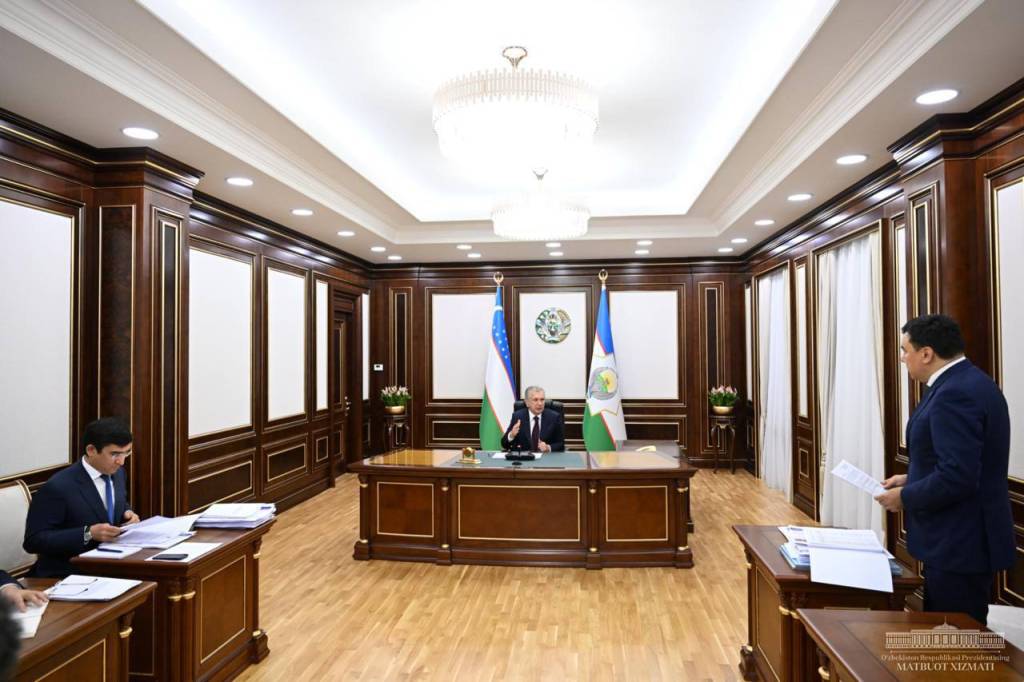On September 19, President Shavkat Mirziyoyev got acquainted with the presentation of environmental protection and tourism proposals.
At present, the issues of maintaining clean air and reducing the impact of anthropogenic factors on the environment are becoming increasingly urgent. Two programs were developed to address these issues.
The first is the National Program to Combat Dust Storms and Mitigate Their Consequences for 2024-2030. This document provides for a phased, complete ban on the sale and use of fuel below the Euro-4 standard. To this end, the Bukhara and Fergana oil refineries will be modernized to produce high-quality fuel.

The second is a program of measures aimed at improving the quality of atmospheric air in the city of Tashkent. According to this program, green belts and parks will be created on 441 hectares in the capital and adjacent areas of Tashkent region in the next five years.
To streamline the work on sanitary cleaning, it is proposed to create an Agency for Waste Management and Circular Economy Development based on the existing center. A rating system for enterprises on sanitary cleaning will be introduced, dividing them into three categories depending on their performance indicators.
It is envisaged to establish a requirement: when designing newly constructed buildings more than 12 meters high or with a total area of more than 500 square meters, at least 25 percent of the adjacent territory must be greened. In addition, industrial enterprises that significantly impact the environment will be required to create green belts.

Attention was paid to preventing environmental violations and strengthening public control in this area. To encourage active and proactive citizens, the honorary title of “Honored Ecologist of the Republic of Uzbekistan” was proposed.
The issue of joining the Aarhus Convention on Access to Information, Public Participation in Decision-Making and Access to Justice in Environmental Matters was considered.
It was noted that it would be appropriate to introduce an article on non-compliance with air quality protection requirements at construction sites into the Code of Administrative Liability. It is also planned to tighten financial sanctions for fines for cutting down and intentionally drying trees, illegally extracting sand and gravel from river beds, and dumping waste in unauthorized places.
An eco-labeling system was introduced in the country by the Cabinet of Ministers’ resolution of May 27, 2019. Now, in accordance with the international standard ISO 14024, voluntary eco-labeling of products and services called “Yashil Belgi” (“Green Mark”) will be introduced. Industry schedules for installing automated monitoring stations, dust and gas cleaning equipment, and local water treatment facilities at 2,336 economic entities will be approved.
A Green Charitable Foundation without the status of a legal entity will be created under the Ministry of Ecology, which will be managed under public control. The possibility of voluntary charitable contributions “Green Payment” will be introduced in the applications of electronic payment systems.
Another gap in the sphere is the issue of keeping wild animals. Keeping such animals in households is not regulated by law. In this regard, it is envisaged to determine that wild animals maintained by individuals and kept in circuses and tents will be transferred to rehabilitation centers at zoos, oceanariums, nurseries, and research institutions.
Measures to develop medical tourism were also discussed at the presentation.
To this end, Uzbekistan will be positioned as the “center of attraction” of Central Asia. The program “Hospitality in Medical Services” will be implemented. It is planned to stimulate the activities of medical and health institutions and launch their unified register. The work of sanatoriums with categories similar to hotel “stars” will be established.
The Head of state instructed the careful revision of the drafts of the relevant documents and the effective organization of their implementation.
UzA
- Added: 20.09.2024
- Views: 1445
 Ўзбекча
Ўзбекча English
English Русский
Русский
